Last updated: 25 April 2015
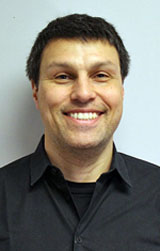
VINCENZO BOLLETTINO, Executive Director
Harvard Humanitarian Initiative
Dr. Bollettino is Executive Director of the Harvard Humanitarian Initiative. Dr. Bollettino has twenty years of professional and academic experience in international politics, humanitarian action, human security and peacebuilding. He has managed several large training and policy development initiatives related to international humanitarian law, responsibility to protect, and peace building operations and has designed several reporting systems and program evaluations for field security measures in complex emergencies. Dr. Bollettino has authored several publications related to disaster management and humanitarian assistance, and has consulted with numerous international nongovernmental organization and UN agencies. His most recent research focuses on civil-military engagement in response to natural disasters.
[expand title=”Read Full Bio” swaptitle=”Hide Full Bio”]Dr. Bollettino is Executive Director of the Harvard Humanitarian Initiative. Dr. Bollettino has twenty years of professional and academic experience in international politics, humanitarian action, human security and peacebuilding. He has spent that past ten years of his career at Harvard University in administration, teaching, and research. Prior to joining HHI in 2008, Dr. Bollettino worked with the Program on Humanitarian Policy and Conflict Research and taught courses on research design, peace building, and international politics at the Harvard Extension School.
Dr. Bollettino came to Harvard University on a post-doctoral fellowship with the Program on Non-violent Sanctions and Cultural Survival at the Weatherhead Center for International Affairs. He completed his Ph.D. at the Graduate School of International Studies at the University of Denver and has over fifteen years of experience on human security, the security of humanitarian aid workers, conflict research, and humanitarian studies. He has managed several large training and policy development initiatives related to international humanitarian law, responsibility to protect, and peace building operations and has designed several reporting systems and program evaluations for field security measures in complex emergencies.
Dr. Bollettino has authored several publications related to disaster management and humanitarian assistance, and has consulted with numerous international nongovernmental organization and UN agencies. His most recent research focuses on civil-military engagement in response to natural disasters.
[/expand]
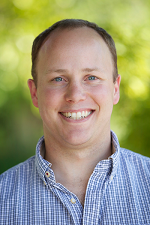
JOHN CLARK, Skybox Partner Development
John is on the Partner Development team at Skybox, an emerging business unit within Google. At Skybox, John is focused on connecting partners and end-users with imagery-based analytics for both humanitarian and commercial applications using Skybox technology.
[expand title=”Read Full Bio” swaptitle=”Hide Full Bio”]John Clark is on the Partner Development team at Skybox, an emerging business unit within Google. At Skybox, John is focused on connecting partners and end-users with imagery-based analytics for both humanitarian and commercial applications using Skybox technology.
[/expand]
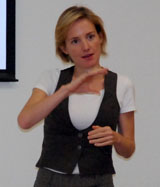
TINA COMES, Associate Professor
Centre for Integrated Emergency Management, University of Agder
Tina Comes is Associate Professor at the Department of ICT, University of Agder, Norway and Deputy Director of the Centre for Integrated Emergency Management. Tina’s main research areas include modeling of supply chains and logistics networks, critical infrastructures and the impact of their disruption, crisis management, policy-making and design of viable strategies in a dynamic context as well as multi-criteria decision analysis.
[expand title=”Read Full Bio” swaptitle=”Hide Full Bio”]Tina Comes is Associate Professor at the Department of ICT, University of Agder, Norway and Deputy Director of the Centre for Integrated Emergency Management. She studied Mathematics, literature and philosophy. After receiving her Ph.D. on the topic of distributed scenario-based multi-criteria decision support from the Karlsruhe Institute of Technology (KIT), she was head of a research group on Risk Management (2011-2013). She was heading the group on socio-economic impact assessment of the Centre for Disaster Management and Risk Reduction Technology (CEDIM), a joint initiative by the German Research Centre for Geosciences and KIT and lead the Risk Management Team at the KSRI Supply Chain Lab, to which she is still affiliated.
Tina’s research aims at supporting decision-making and risk management in complex, dynamic and uncertain situations, when experts and decision-makers with different backgrounds and skills need to build a consensus that must be acceptable for various actors across organizations. To this end, she develops methods and tools designed to bridge the gap between formal models, expert systems and simulations and transparent, understandable and ready- to-use evaluations and presentations of results. Particularly, she focuses on the development of collaborative and distributed decision support tools, which are designed to enhance under- standing, communication and compliance. Tina’s main research areas include modeling of supply chains and logistics networks, critical infrastructures and the impact of their disruption, crisis management, policy-making and design of viable strategies in a dynamic context as well as multi-criteria decision analysis. To cover this domain, she combines her formal and analytic background in mathematics with programming skills, knowledge in economics, decision theory and cognition.
Tina is author of various papers that are published in international journals and conferences. She has organized tracks at different international conferences such as HICSS or AMCIS, was Programme Chair of the ISCRAM2013 Conference, Program Director of the 2014 ISCRAM Summer School, Conference Chair of ISCRAM2015 and is Chair of the ISCRAM Events Committee.
[/expand]
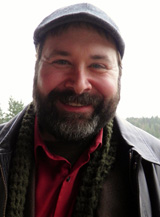
LEWIS CURTIS, Director – Microsoft Services Disaster Response
Microsoft Corporation
As the Director of Microsoft Services Disaster Response, Lewis is accountable for the safety and success of all Microsoft services teams and ground operations for disaster response worldwide. Lewis has been a long time technology architect and program manager for many years at Microsoft leading initiatives in datacenter design, cyber security and disaster recovery and resiliency operations. Before Microsoft, Lewis worked for Sun Microsystems and Digital Equipment Corporation.
[expand title=”Read Full Bio” swaptitle=”Hide Full Bio”]As the Director of Microsoft Services Disaster Response, Lewis is accountable for the safety and success of all Microsoft services teams and ground operations for disaster response worldwide. Lewis has been a long time technology architect and program manager for many years at Microsoft leading initiatives in datacenter design, cyber security and disaster recovery and resiliency operations. Before Microsoft, Lewis worked for Sun Microsystems and Digital Equipment Corporation.
Outside of work, He and his wife Linda have been married for over 15 years and reside on their 12 acre farm in Duvall WA raising dairy goats, chickens, honey bees and hogs.
[/expand]
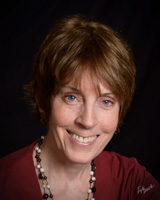
REBECCA CURZON, Senior Program Manager – Corporate Citizenship and Corporate Affairs
IBM
Rebecca E. Curzon is Senior Program Manager with IBM Corporate Citizenship and Corporate Affairs, with leadership roles in business integration, philanthropy, and volunteer enablement. Ms. Curzon manages IBM’s global strategy in humanitarian disaster response, applying IBM technology, solutions, expertise and innovation to critical needs in the aftermath of disaster; and developing strategic partnerships around mitigation of the effects of disaster using technology for smarter and more resilient cities. She represents IBM on the US Chamber of Commerce Foundation’s Disaster Assistance and Recovery Working Group. She is on the board of directors of the American Red Cross of Massachusetts. Ms. Curzon also leads IBM’s global citizenship Grant-making Center of Excellence, providing IBM’s worldwide citizenship team with training, tools, resources, and best practices for awarding strategic grants from IBM’s growing portfolio of Impact Grant offerings, all in support of local nonprofit and education partners as they address societal issues and achieve results.[/expand]
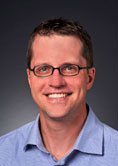
JARROD GOENTZEL, Founder and Director
MIT Humanitarian Response Lab
Jarrod Goentzel is founder and director of the MIT Humanitarian Response Lab in the MIT Center for Transportation & Logistics and is a research lead for the MIT Comprehensive Initiative on Technology Evaluation sponsored by USAID. His research focuses on meeting human needs in resource-constrained settings through better supply chain management, information systems and decision support technology. Dr. Goentzel balances theoretical and applied work through active engagement with the private sector, government agencies, humanitarian, international development, and community organizations on several continents. He has over 20 years of experience designing supply chains and developing information technology solutions.
[expand title=”Read Full Bio” swaptitle=”Hide Full Bio”]Jarrod Goentzel is founder and director of the MIT Humanitarian Response Lab in the MIT Center for Transportation & Logistics and is a research lead for the MIT Comprehensive Initiative on Technology Evaluation sponsored by USAID. His research focuses on meeting human needs in resource-constrained settings through better supply chain management, information systems and decision support technology. Dr. Goentzel balances theoretical and applied work through active engagement with the private sector, government agencies, humanitarian, international development, and community organizations on several continents. He has over 20 years of experience designing supply chains and developing information technology solutions. Dr. Goentzel has created graduate-level courses in humanitarian logistics, international operations and supply chain finance, and has extensive experience using simulation games to build intuition and leadership skills.
Previously, Dr. Goentzel was Executive Director of the MIT Supply Chain Management Program, where he was responsible for design and management of the nine-month professional master’s degree program. He joined MIT in 2003 to establish the MIT-Zaragoza International Logistics Program, which developed novel education, research, and outreach programs with the Zaragoza Logistics Center in Spain.
Dr. Goentzel received a Ph.D. from the School of Industrial and Systems Engineering at the Georgia Institute of Technology, an M.S. in applied mathematics from Colorado State University, and a B.A. in mathematics from Tabor College with studies at the Technical University of Budapest (Hungary).
[/expand]
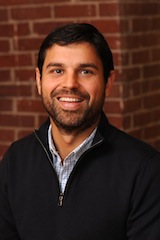
MIGUEL GRANIER, Founder and Managing Director
Invested Development
Miguel is the Founder and Managing Director of Invested Development, which launched in July 2009. Before founding Invested Development, he was the founding Investment Manager for First Light Ventures, a seed-stage social impact investment fund affiliated with Gray Ghost Ventures in Atlanta, Georgia.
[expand title=”Read Full Bio” swaptitle=”Hide Full Bio”]Miguel is the Founder and Managing Director of Invested Development, which launched in July 2009. Before founding Invested Development, he was the founding Investment Manager for First Light Ventures, a seed-stage social impact investment fund affiliated with Gray Ghost Ventures in Atlanta, Georgia.
Miguel began his career in social enterprise as a loan officer for ACCION New York in 2003 and continued that work as an independent consultant specializing in economic development and microfinance. In addition to his work in microfinance and social enterprise, Miguel has worked for the insurance giant Fidelity National Financial in New York and Delter Business Institute in Beijing, China.
He holds a Master’s Degree in City and Regional Planning from the Georgia Institute of Technology with a specialization in Entrepreneurship and Economic Development.[/expand]
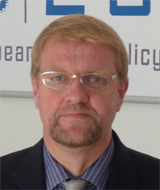
PETER HULSROJ, Director
European Space Policy Institute (ESPI)
Peter Hulsroj obtained law degrees from the University of Copenhagen and Harvard Law School. Mr. Hulsroj then qualified as a practising attorney with the large Danish law firm Bech-Bruun. After this he served as a contracts officer in ESA and, for 14 years, as the Head of Contracts and Legal Affairs of the international organisation Eumetsat. This was followed by a stay in Vienna as the Legal Adviser of the Comprehensive Nuclear-Test-Ban Treaty Organization. In 2008 Mr. Hulsroj was appointed the Director of the Legal Affairs and External Relations Directorate of the European Space Agency, where he was until taking up the post as the Director of ESPI in 2011. Mr. Hulsroj has published a significant number of articles on public international law, space law and international governance in peer-reviewed journals and recently published a book, The Principle of Proportionality, on ethical, legal and governance issues.
[expand title=”Read Full Bio” swaptitle=”Hide Full Bio”]Peter Hulsroj obtained law degrees from the University of Copenhagen and Harvard Law School. Mr. Hulsroj then qualified as a practising attorney with the large Danish law firm Bech-Bruun. After this he served as a contracts officer in ESA and, for 14 years, as the Head of Contracts and Legal Affairs of the international organisation Eumetsat. This was followed by a stay in Vienna as the Legal Adviser of the Comprehensive Nuclear-Test-Ban Treaty Organization. In 2008 Mr. Hulsroj was appointed the Director of the Legal Affairs and External Relations Directorate of the European Space Agency, where he was until taking up the post as the Director of ESPI in 2011. Mr. Hulsroj has published a significant number of articles on public international law, space law and international governance in peer-reviewed journals and recently published a book, The Principle of Proportionality, on ethical, legal and governance issues.[/expand]
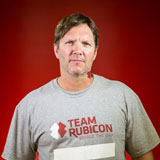
STEPHEN HUNT, Chief Information Officer
Team Rubicon
Steve Hunt is a scientist, engineer, infantryman, manager, and construction worker. He holds a few degrees including a PhD in Electrical Engineering. Steve was a paratrooper with the 82nd Airborne and a reservist. Before joining TR, he spent 25 years at MIT Lincoln Laboratory working in support of US national interests and has extensive experience in operations and technical R&D. For about 10 years Steve has supported humanitarian work inside and outside the US. Prior to being CIO, Steve was the Director of Field Operations for Region I.
[expand title=”Read Full Bio” swaptitle=”Hide Full Bio”]Steve Hunt is a scientist, engineer, infantryman, manager, and construction worker. He holds a few degrees including a PhD in Electrical Engineering. Steve was a paratrooper with the 82nd Airborne and a reservist. Before joining TR, he spent 25 years at MIT Lincoln Laboratory working in support of US national interests and has extensive experience in operations and technical R&D. For about 10 years Steve has supported humanitarian work inside and outside the US. Prior to being CIO, Steve was the Director of Field Operations for Region I.[/expand]
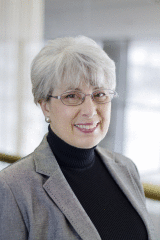
RHONDA JACOBS, Program Manager
Society of Exploration Geophysicists
Rhonda Jacobs serves as Program Manager of the Geoscientists Without Borders® (GWB) humanitarian program. Prior to joining the Society of Exploration Geophysicists to create the GWB program in 2008, Rhonda worked as a research program manager for the U.S. Department of Energy – Office of Fossil Energy National Energy Technology Laboratory in Tulsa. She also worked for the Department of Interior, Office of Surface Mining and Reclamation and Enforcement as regulatory specialist. Before government employment, she worked in several US Regions as a geoscientist with a major oil exploration and development company.
[expand title=”Read Full Bio” swaptitle=”Hide Full Bio”]Rhonda Jacobs serves as Program Manager of the Geoscientists Without Borders® (GWB) humanitarian program. She works to promote project best practices, HSSE standards and sustainable outcomes from every project. In addition, her role is to expand the young but very successful program through multiple methods of outreach.
Prior to joining the SEG to create the GWB program in 2008, Rhonda worked as a research program manager for the U.S. Department of Energy – Office of Fossil Energy National Energy Technology Laboratory in Tulsa. She also worked for the Department of Interior, Office of Surface Mining and Reclamation and Enforcement as regulatory specialist. Before government employment, she worked in several US Regions as a geoscientist with a major oil exploration and development company.
[/expand]
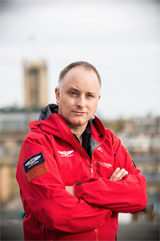
DAVID JONES, CEO
Rescue Global
David Jones is the Chief Executive of Rescue Global, an international NGO specialising in Disaster Risk Reduction and Response, based in London and New York. David has spent his career in the private, uniformed and civilian emergency services sectors, specialising in operational command, control and instruction. He is a multi-disciplinarian and qualified instructor in strategic emergency and disaster risk reduction and response, incident command, multi-agency command support, search and rescue operations and contingency planning. He leads operations and training teams all over the world, for which he has received awards from the British Royal Family and numerous heads of state. David is on the Leadership Council of the United Nations (UN) Foundation, Humanitarian Awards, and the Editorial Panel of the Crisis Response Journal. He is an advisor in the fields of Disaster Risk Reduction and Response at nation state level, as well as project lead on disaster management development projects for the governments of the USA, India and the Philippines.
[expand title=”Read Full Bio” swaptitle=”Hide Full Bio”]David Jones is the Chief Executive of Rescue Global, an international NGO specialising in Disaster Risk Reduction and Response, based in London and New York. David has spent his career in the private, uniformed and civilian emergency services sectors, specialising in operational command, control and instruction. He is a multi-disciplinarian and qualified instructor in strategic emergency and disaster risk reduction and response, incident command, multi-agency command support, search and rescue operations and contingency planning. He leads operations and training teams all over the world, for which he has received awards from the British Royal Family and numerous heads of state. David is on the Leadership Council of the United Nations (UN) Foundation, Humanitarian Awards, and the Editorial Panel of the Crisis Response Journal. He is an advisor in the fields of Disaster Risk Reduction and Response at nation state level, as well as project lead on disaster management development projects for the governments of the USA, India and the Philippines. He is a guest speaker at the Emergency Planning College (Cabinet Office, United Kingdom) and the United States National Search and Rescue Academy, Federal Agencies (NSARA). David co-supervises PhD Candidates at the University College London (UCL), in the fields of Disaster Management and Response.
He is one of the co-founders of Rescue Global.
[/expand]
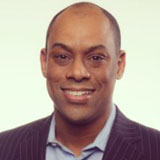
ANDRE KEARNS, Senior Director, US Government Product Management
DigitalGlobe
Andre Kearns is currently Senior Director, US Government Product Management for DigitalGlobe and leads the effort to identify, incubate and scale new value added products that support US Government mission areas. In this role, he is focused on helping organizations better leverage DigitalGlobe’s portfolio of imagery, information, and insight products and capabilities to anticipate and respond to global threats and humanitarian crises and disaster events.
[expand title=”Read Full Bio” swaptitle=”Hide Full Bio”]Andre Kearns is currently Senior Director, US Government Product Management for DigitalGlobe and leads the effort to identify, incubate and scale new value added products that support US Government mission areas. In this role, he is focused on helping organizations better leverage DigitalGlobe’s portfolio of imagery, information, and insight products and capabilities to anticipate and respond to global threats and humanitarian crises and disaster events. An accomplished executive, Andre has focused his career in technology, primarily serving in product marketing and strategy roles.
Andre holds an MBA from Harvard University and a BA in Business Administration from Morehouse College. He lives in Washington, DC with his wife and two children and offices out of the DigitalGlobe Herndon office. [/expand]
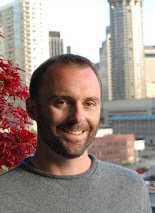
JAKE KENDALL, Senior Program Officer
Bill and Melinda Gates Foundation
Jake Kendall is a Program Officer on the Financial Services for the Poor team working with the Policy and Research initiative. His work focuses on managing and coordinating the research activities of FSP including managing FSP’s major research grants and engaging with the researcher community. Previous to joining the Foundation, he spent time as a researcher with the Consultative Group to Assist the Poor (CGAP) housed in the World Bank. Jake holds a PhD in Economics from UC Santa Cruz and a BS in Physics from MIT.
[expand title=”Read Full Bio” swaptitle=”Hide Full Bio”]Jake Kendall is a Program Officer on the Financial Services for the Poor team working with the Policy and Research initiative. His work focuses on managing and coordinating the research activities of FSP including managing FSP’s major research grants and engaging with the researcher community. Previous to joining the Foundation, he spent time as a researcher with the Consultative Group to Assist the Poor (CGAP) housed in the World Bank. Jake holds a PhD in Economics from UC Santa Cruz and a BS in Physics from MIT. Just after graduating from MIT he volunteered for two years in Zambia as a fisheries extension agent with the US Peace Corps. Jake has also worked as a Brand Analyst for a major advertising firm, a technical salesperson for two high tech start ups, and, throughout his youth, a salmon fisherman in Alaska.[/expand]
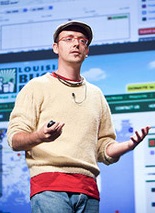
PATRICK MEIER, Director of Social Innovation
Qatar Computing Research Institute
Patrick Meier (PhD) is an internationally recognized thought leader on the application of new technologies for crisis early warning, humanitarian response and resilience. He presently serves as Director of Social Innovation at the Qatar Computing Research Institute (QCRI) where he develops and prototypes Next Generation Humanitarian Technologies with multiple humanitarian organizations. He is a member of the World Humanitarian Summit (WHS) Innovation Team and the author of the forthcoming book “Digital Humanitarians: How Big Data is Changing the Face of Humanitarian Response” (2015). Patrick is also a UNICEF Humanitarian Innovations Fellow, a National Geographic Emerging Explorer, an “Ambassador” for Drone Adventures and a Fellow at the Rockefeller Foundation & PopTech. His influential blog iRevolutions has received over 1.5 million hits. In 2010 he was publicly praised by Clinton for his pioneering digital humanitarian efforts.
[expand title=”Read Full Bio” swaptitle=”Hide Full Bio”]Patrick Meier (PhD) is an internationally recognized thought leader on the application of new technologies for crisis early warning, humanitarian response and resilience. He presently serves as Director of Social Innovation at the Qatar Computing Research Institute (QCRI) where he develops and prototypes Next Generation Humanitarian Technologies with multiple humanitarian organizations. He is a member of the World Humanitarian Summit (WHS) Innovation Team and the author of the forthcoming book “Digital Humanitarians: How Big Data is Changing the Face of Humanitarian Response” (2015). Patrick is also a UNICEF Humanitarian Innovations Fellow, a National Geographic Emerging Explorer, an “Ambassador” for Drone Adventures and a Fellow at the Rockefeller Foundation & PopTech. His influential blog iRevolutions has received over 1.5 million hits. In 2010 he was publicly praised by Clinton for his pioneering digital humanitarian efforts.
Prior to QCRI, Patrick co-founded and co-directed the Harvard Humanitarian Initiative’s (HHI) Program on Crisis Mapping & Early Warning and served as Director of Crisis Mapping at Ushahidi. He has consulted extensively for several international organizations including the United Nations and the World Bank. He co-founded CrisisMappers, MicroMappers, Digital Humanitarians, the award-winning Standby Task Force and sits on the Board of iLab Liberia. Patrick is an accomplished speaker, having given talks at the White House, UN, Google, Harvard, Stanford and MIT. He has also presented at major international conferences including the Skoll World Forum, Club de Madrid, Mobile World Congress, PopTech, Where 2.0, TTI/Vanguard, SXSW and several TEDx’s. In 2010, he was publicly praised by President Bill Clinton for his digital humanitarian efforts. Given his unique expertise, Patrick is often interviewed by the media, which has included the New York Times, Washington Post, BBC, The Economist, Wall Street Journal, UK Guardian, CNN, NPR and Wired. He is also a distinguished scholar, holding a PhD from The Fletcher School, a Pre-Doctoral Fellowship from Stanford University, an MA from Columbia University and EAP from UC Berkeley. In addition, he was a Research Fellow at the Peace Research Institute, Oslo (PRIO) and holds an advanced certificate in complexity science from the Santa Fe Institute (SFI). Patrick has given numerous guest lectures and has taught several professional, graduate and undergraduate courses. He writes the widely respected iRevolution blog and tweets at @patrickmeier.
[/expand]
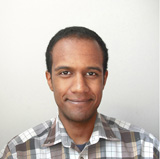
SAFY NURHUSSEIN, Geographic Information Specialist
Office of Transition Initiatives (OTI), USAID
Safy Nurhussein is a Geographic Information Specialist at the Office of Transition Initiatives (OTI), a USAID office supporting U.S. foreign policy goals by advancing peace and democracy in countries experiencing crisis, conflict & political transition. His work focuses on helping fellow OTI staff and partners to collect, analyze and visualize information for decision-making in the field.
[expand title=”Read Full Bio” swaptitle=”Hide Full Bio”]Safy Nurhussein is a Geographic Information Specialist at the Office of Transition Initiatives (OTI), a USAID office supporting U.S. foreign policy goals by advancing peace and democracy in countries experiencing crisis, conflict & political transition. His work focuses on helping fellow OTI staff and partners to collect, analyze and visualize information for decision-making in the field.[/expand]
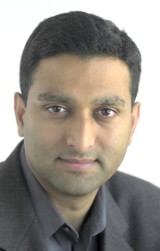
RAMESH RASKAR, Associate Professor
MIT Media Lab
Ramesh Raskar joined the Media Lab from Mitsubishi Electric Research Laboratories in 2008 as head of the Lab’s Camera Culture research group. His research interests span the fields of computational photography, inverse problems in imaging and human-computer interaction. Recent projects and inventions include transient imaging to look around a corner, a next generation CAT-Scan machine, imperceptible markers for motion capture (Prakash), long distance barcodes (Bokode), touch+hover 3D interaction displays (BiDi screen), low-cost eye care devices (Netra,Catra), new theoretical models to augment light fields (ALF) to represent wave phenomena and algebraic rank constraints for 3D displays(HR3D).
[expand title=”Read Full Bio” swaptitle=”Hide Full Bio”]Ramesh Raskar joined the Media Lab from Mitsubishi Electric Research Laboratories in 2008 as head of the Lab’s Camera Culture research group. His research interests span the fields of computational photography, inverse problems in imaging and human-computer interaction. Recent projects and inventions include transient imaging to look around a corner, a next generation CAT-Scan machine, imperceptible markers for motion capture (Prakash), long distance barcodes (Bokode), touch+hover 3D interaction displays (BiDi screen), low-cost eye care devices (Netra,Catra), new theoretical models to augment light fields (ALF) to represent wave phenomena and algebraic rank constraints for 3D displays(HR3D).
In 2004, Raskar received the TR100 Award from Technology Review, which recognizes top young innovators under the age of 35, and in 2003, the Global Indus Technovator Award, instituted at MIT to recognize the top 20 Indian technology innovators worldwide. In 2009, he was awarded a Sloan Research Fellowship. In 2010, he received the Darpa Young Faculty award. Other awards include Marr Prize honorable mention 2009, LAUNCH Health Innovation Award, presented by NASA, USAID, US State Dept and NIKE, 2010, Vodafone Wireless Innovation Project Award (first place), 2011. He holds over 40 US patents and has received four Mitsubishi Electric Invention Awards. He is currently co-authoring a book on Computational Photography.[/expand]
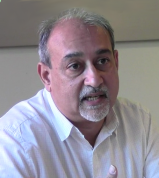
TARUN SARWAL, Head of the Innovation Initiative
International Committee of the Red Cross (ICRC)
Tarun Sarwal is currently leading the Innovation Initiative at the ICRC. The purpose of the post is to facilitate innovation in support of humanitarian action throughout the ICRC. The main work streams include building a positive narrative around innovation, managing an internal fund to support innovation pilots, making external links to stimulate innovation, and supporting internal systems to enable innovation.
[expand title=”Read Full Bio” swaptitle=”Hide Full Bio”]Prior to working with ICRC, Tarun worked in the UK NGO sector and with the BRCS. At ICRC Tarun’s previous posting was with the Economic Security Unit where he was responsible for promoting cash based approaches and overseeing the design of programmes in Africa, Asia and the Caucasus. Tarun Sarwal is currently leading the Innovation Initiative at the ICRC. The purpose of the post is to facilitate innovation in support of humanitarian action throughout the ICRC. The main work streams include building a positive narrative around innovation, managing an internal fund to support innovation pilots, making external links to stimulate innovation, and supporting internal systems to enable innovation.[/expand]
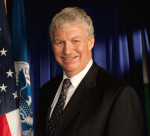
RICHARD SERINO, Former Deputy Administrator of FEMA
Distinguished Visiting Fellow at Harvard University School of Public Health
The Hon. Richard Serino spent more than forty years in public service. During that time he provided extensive leadership on emergency management, emergency medical and homeland security at local, state, federal and international levels. Mr. Serino is currently a Distinguished Visiting Fellow at Harvard University’s School of Public Health, National Preparedness Leadership Initiative.
[expand title=”Read Full Bio” swaptitle=”Hide Full Bio”]The Hon. Richard Serino spent more than forty years in public service. During that time he provided extensive leadership on emergency management, emergency medical and homeland security at local, state, federal and international levels. Mr. Serino is currently a Distinguished Visiting Fellow at Harvard University’s School of Public Health, National Preparedness Leadership Initiative.
• He was appointed by President Obama and confirmed by the Senate as the Federal Emergency Management Agency’s 8th Deputy Administrator in October 2009 and served until 2014.
• In this role, he also served as the Chief Operating Officer (COO) of the agency with more than $25 billon budget.
• Prior to his appointment as Deputy Administrator, he spent 36 years at Boston EMS where he rose through the ranks to become Chief. He also served as the Assistant Director of the Boston Public Health Commission.
Mr. Serino responded to over 60 national disasters while at FEMA and during Super Storm Sandy, he was the lead federal area commander for New York and New Jersey. Mr. Serino was also on scene at the Boston Marathon bombings as the Department of Homeland Security senior official. A sampling of Federally declared disasters Mr. Serino responded to include: flooding in North Dakota, New England, Georgia and Colorado; the wildfires in Colorado and Texas; the tornadoes in Mississippi, Alabama, Georgia, Joplin, Missouri; tsunami destruction in the American Samoa; and the Hurricane stricken areas from hurricanes Isaac, Irene, and Earl. Mr. Serino briefed the President of the United States on a number of disasters and briefed and traveled with Vice President Biden to a number of affected communities to survey the destruction.
As the Agency’s COO, Mr. Serino fundamentally changed how FEMA operates. He helped FEMA reorient its activities and improve its programs to be “survivor centric,” ensuring that the agency supports the delivery of services focused on easing the recovery experience of survivors – as individuals, neighborhoods, and communities. As Deputy Administrator, he also led administrative improvements that were focused on emphasizing financial accountability, created FEMA Stat, which improved the use of analytics to drive decisions, advanced the workforce training and engagement and fostered a culture of innovation.
Under His leadership, FEMA launched initiatives such as FEMA Corps, a dedicated unit of 1,600 service corps members within AmeriCorps National Civilian Community Corps (NCCC) solely devoted to disaster preparedness, response, and recovery. His leadership took FEMA Corps from idea to implementation in nine months. FEMA Corps is a Presidentially recognized model program of national service that provides eighteen to twenty-four year olds with an opportunity to serve their country during disasters. When the program is at full operational capability, and in an average disaster year, there will be an expected savings of approximately $60 million in a year.
Mr. Serino was also instrumental in developing the FEMA Think Tank, a program that provides a transparent way for citizens to speak directly to government leadership and offer their input and ideas. The monthly calls portion of the Think Tank have not just trended globally on Twitter, but have also given the “Whole of Community” a voice directly to leadership.
During his tenure at Boston EMS he transformed it to one of the best and nationally recognized EMS systems in the country. He bolstered the city’s response plans for major emergencies, including chemical, biological, and radiological attacks. He also led citywide planning for the first influenza pandemic in more than 40 years.
Mr. Serino served as an Incident Commander for over thirty-five mass casualty incidents and for all of Boston’s major planned events, including the Boston Marathon, Boston’s Fourth of July celebration, First Night, and the 2004 Democratic National Convention, a National Special Security Event.
He has received more than thirty-five local, national and international awards for public service and innovation; including Harvard University National Public Leadership Institute’s “Leader of the Year”; nationally recognized as an Innovator in EMS with the “Innovators in EMS Award” and Boston’s highest Public Service award, “Henry L Shattuck Public Service Award”.
Mr. Serino published more than ten articles, including: “Emergency Medical Consequence Planning and Management for National Special Security Events After September 11: Boston: 2004,” Disaster Medicine and Public Health Preparedness, August 2008; and “In a Moment’s Notice: Surge Capacity for Terrorist Bombings,” U.S. Department of Health and Human Services, Centers for Disease Control and Prevention, April 2007.
Mr. Serino attended Harvard University’s Kennedy School of Government Senior Executives in State and Local Government program in 2000, completed the Kennedy School’s National Preparedness Leadership Initiative in 2005, and graduated the Executive Leadership Program, Center for Homeland Defense and Security at the Naval Postgraduate School.
[/expand]
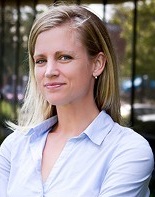
DEBORAH THEOBALD, Co-Founder and Executive Director
Vecna Technologies and Vecna Cares
Deborah has spent 15 years developing and deploying automation solutions to the health care sector both domestically and internationally. As the Co-Founder of Vecna, a leader in health care information technology and robotics, Deborah has positively impacted millions of peoples’ lives through innovative new technologies that improve access to and quality of care. In 2009, Deborah established the Vecna Cares Charitable Trust to extend Vecna resources in IP, engineering capacity and programmatic expertise to developing countries and under-served areas. Vecna Cares supports ongoing initiatives in East Africa, Nigeria and Haiti as well as Massachusetts urban communities.
[expand title=”Read Full Bio” swaptitle=”Hide Full Bio”]Deborah has spent 15 years developing and deploying automation solutions to the health care sector both domestically and internationally. As the Co-Founder of Vecna, a leader in health care information technology and robotics, Deborah has positively impacted millions of peoples’ lives through innovative new technologies that improve access to and quality of care. Deborah has brought to market QC PathFinder for electronic outbreak surveillance of hospital acquired infections and Patient Self Service Kiosk, Portal and Mobile solutions. Vecna’s Department of Defense funded BEAR (Battlefield Extraction and Recovery) and the QC Bot Hospital Logistics Robots.
In 2009, Deborah established the Vecna Cares Charitable Trust to extend Vecna resources in IP, engineering capacity and programmatic expertise to developing countries and under-served areas. Vecna Cares supports ongoing initiatives in East Africa, Nigeria and Haiti as well as Massachusetts urban communities. Deborah is actively engaged in forging new community partnerships around the world with the goal of improving quality and access to health care through the establishment of local, point-of-care patient data tools to regional information technology infrastructures.
Deborah obtained her SB in Aerospace Engineering from MIT and her Masters from University of Maryland’s Space Systems She is a certified SCUBA Diver Instructor and the proud mother of 5 very active children.[/expand]
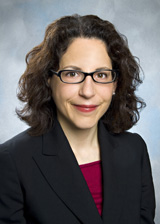
REBECCA WEINTRAUB, Assistant Professor in Medicine
Harvard University
Rebecca Weintraub, MD, is an assistant professor at Harvard Medical School and faculty director of the Global Health Delivery Project (GHD) at Harvard University. She is an associate physician at Brigham and Women’s Hospital in the Division of Global Health Equity and practices medicine within the Department of Medicine. Weintraub is a co-faculty lead for the Global Health Delivery Intensive at Harvard, a joint Harvard Medical School and Harvard School of Public Health training to introduce key principles in global health delivery to providers and implementers. Her research projects, funded by the Agency for Healthcare Research and Quality, World Health Organization, the Global Fund and the Bill & Melinda Gates Foundation, focus on strategies to generate value-based delivery in global health. Weintraub co-founded Jumpstart, the national AmeriCorps program, and is a technical advisor to Ashoka Living Goods and non-profits promoting the work of health entrepreneurs.
[expand title=”Read Full Bio” swaptitle=”Hide Full Bio”]
Rebecca Weintraub, MD, is an assistant professor at Harvard Medical School and faculty director of the Global Health Delivery Project (GHD) at Harvard University. She is an associate physician at Brigham and Women’s Hospital in the Division of Global Health Equity and practices medicine within the Department of Medicine. GHD has published a global health delivery curriculum of over 30 Harvard Business School case studies with Harvard Business Publishing, available online at no cost to the public. Weintraub is a co-faculty lead for the Global Health Delivery Intensive at Harvard, a joint Harvard Medical School and Harvard School of Public Health training to introduce key principles in global health delivery to providers and implementers. In 2008, GHD launched GHDonline.org, a network of virtual professional communities that today connects more than 13,500 global health implementers from 182 countries and 4,000 organizations. Her research projects, funded by the Agency for Healthcare Research and Quality, World Health Organization, the Global Fund and the Bill & Melinda Gates Foundation, focus on strategies to generate value-based delivery in global health.
Weintraub co-founded Jumpstart, the national AmeriCorps program, and is a technical advisor to Ashoka Living Goods and non-profits promoting the work of health entrepreneurs. She graduated from Yale University and Stanford Medical School and completed her medical training at Brigham and Women’s Hospital.
[/expand]

GREG WILSON, Director
National Center for Photovoltaics at the National Renewable Energy Laboratory
Greg Wilson is the Director of the National Center for Photovoltaics at the National Renewable Energy Laboratory (NREL). Greg is responsible for NREL’s photovoltaics (PV) and PV reliability R&D portfolio and for continued development of the National Center for Photovoltaics many interfaces and partnerships with the global PV community.
[expand title=”Read Full Bio” swaptitle=”Hide Full Bio”]Greg Wilson is the Director of the National Center for Photovoltaics (NCPV) at the National Renewable Energy Laboratory. Greg is responsible for NREL’s PV and PV reliability R&D portfolio and for continued development of the NCPV’s many interfaces and partnerships with the global PV community. The National Center for Photovoltaics (NCPV) at NREL focuses on technology innovations that drive industry growth in U.S. photovoltaic (PV) manufacturing. The NCPV is a central resource for US capabilities in PV research, development, deployment, and outreach.
Prior to joining NREL in 2011 he spent nearly 17 years at SunEdison (previously MEMC) where he directed the Epitaxial Silicon and New Materials R&D groups between 1997 and 2009. In 2009 he joined the merger and acquisition team that acquired SunEdison and Solaicx. He has over 25 years of research and development experience and holds a D.Sc. in Chemical Engineering from Washington University.[/expand]